-
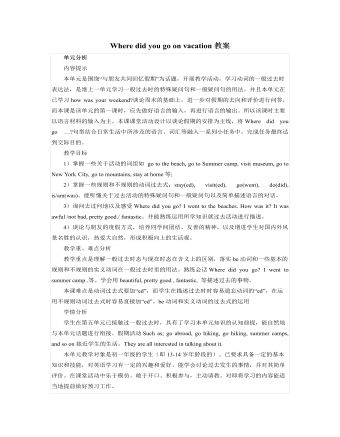
人教版新目标初中英语七年级下册Where did you go on vacation教案
句型: Where did you go on vacation? I went to summer camp.Did she go to Central Park?Yes,she did.No, she didn’t语法:一般过去时特殊疑问句、一般疑问句及肯、否定回答。课时安排4课时第一课时:Section A:la,1b,lc,2a,2b,2c 第二课时:Section A:3a,3b,4第三课时:Section B:1,2a,2b,2c第四课时:Section B:3a,3b,3c,4 and Self Check第一课时教学目标掌握描写假期生活的形容词。假期里自己所做事情的简单表达。谈论假期做的事情及当时情况。谈论假期时旅游的天气,旅游者以及食物等。教学过程一、导入播放一首英文歌曲:Let’s travel 说明:通过让学生听节奏欢快迪斯尼英语歌曲Let’s travel.引入本节课谈论的话题vacation and travel. 让歌曲使学生的思维活跃,增强课堂气氛,激发学生提高学习英语的兴趣。T:How is the trip ?Ss : It’s pretty good/ happy/exciting /relaxing/busy/dangerous/ fantastic说明:这个问题是为了操练形容词。建议让多个Ss作答。鼓励他们用不同的形容词。上述个别形容词本应在第二课时中出现,但可以在warming-up中第一次非正式出现。这些形容词也可在老师的评价语中适时出现,以加深学生对词汇的印象。
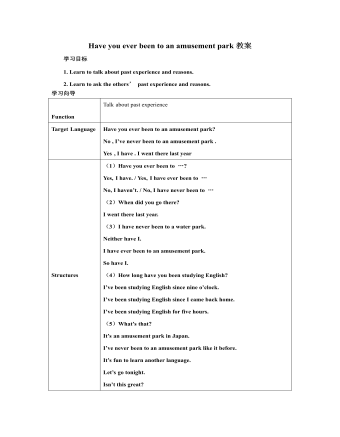
人教版新目标初中英语八年级下册Have you ever been to an amusement park教案
(1)Have you ever been to …? Yes, I have. / Yes, I have ever been to …No, I haven’t. / No, I have never been to …(2)When did you go there? I went there last year. (3)I have never been to a water park. Neither have I. I have ever been to an amusement park. So have I. (4)How long have you been studying English? I’ve been studying English since nine o’clock. I’ve been studying English since I came back home. I’ve been studying English for five hours. (5)What’s that? It’s an amusement park in Japan. I’ve never been to an amusement park like it before. It’s fun to learn another language. Let’s go tonight. Isn’t this great?space museum, amusement park, water park, South America, Peru, Holland, European culture, tour guide, flight attendant, musical instrument, more than, be from, get to, take lessons, neither, discover, graduate, change
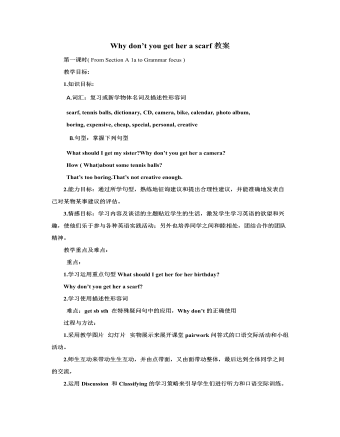
人教版新目标初中英语八年级下册Why don’t you get her a scarf教案
教师带领学生复习有关描述宠物的词汇,采用教师提问学生回答的方进行。如:T:What animals do you think would be good pets?What animals do you think would be bad pets?What do you think are good animals for a six-year-old child?然后学生进行 pairwork 练习。Task two: 师生互动,学习探究 1、播放3a部分的录音,引导学生一边听录音,一边跟读。2、通过听录音学生回答以下问题:Why do you think pot-bellied pigs are popular?What are the advantages and disadvantages of keeping such a pet?教师对学生的回答进行及时点评。3.学习范文,学习重点短语,为下步的模仿写作提供语言素材。T :1. )Have you ever kept a pig as a pet?Do you like pigs? St.:No.…Why don’t you like to keep a pig? St: No.They’re too dirty and lazy(Do you know in some foreign countries like Hollyland, Australia,pigs are the most popular pet.there’s a kind of pig.(图)it has an interesting name? it ‘s called a pot-bellied pig.) Now,let’s learn an article about this kind of interesting pet.2.)play the tapeSt.:Listen and repeat3.)show some Qs on computer(本子St.: read silently,then answerthe Qs(本子)4.)Ask ss. Close book and retell this passage.(what is a pot-bellied pig? Is it a good or bad pet? ) St.: retell it to each other“A pot –bellied pig is a popular pet now…”5.read the article together.St.:.practice reading
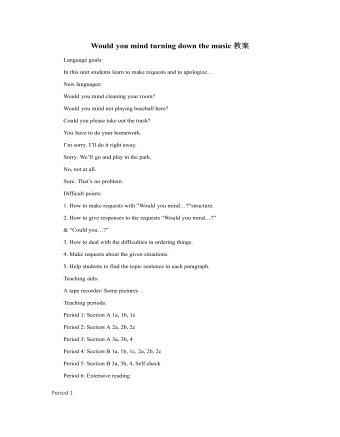
人教版新目标初中英语八年级下册Would you mind turning down the music教案
Step 4. Group work (4)1. Ask a pair of students to read the dialogue. Say, This activity provides speaking, listening and writing practice using the target language.2. Ask students to complete the work in groups.3. Check the answers with the whole class. 4. Explain some of the language points. Step 5. Word review (Self check 1)1. Ask students to read the words and the phrases given. 2. Fill in the blanks with proper forms of these words to complete the sentences. 3. Check the answers with the whole class. Homework:Do activity 2 on page 57 after class. Period 6Teaching aims: 1. Teach vocabulary words and the useful expressions. 2. Enable the students to learn etiquette in different culture. 3. Help the students learn how to behave politely in public places and in daily life. Teaching procedures:Step 1. RevisionHelp students to review the function of making requests through a free talk. Then lead them to the topic of etiquette. Explain the meaning of etiquette. Or, ask students to look it up in the dictionary. Step 2. Pre-reading (Section 1)1. Ask students to read the picture and make a list with their partner about how many rules of etiquette can be seen being broken.
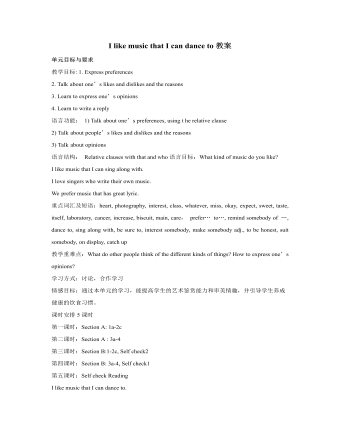
人教版新目标初中英语九年级上册I like music that I can dance to教案
教学目标: 1. Express preferences2. Talk about one’s likes and dislikes and the reasons3. Learn to express one’s opinions 4. Learn to write a reply 语言功能: 1) Talk about one’s preferences, using t he relative clause2) Talk about people’s likes and dislikes and the reasons3) Talk about opinions语言结构: Relative clauses with that and who语言目标:What kind of music do you like?I like music that I can sing along with.I love singers who write their own music.We prefer music that has great lyric.重点词汇及短语:heart, photography, interest, class, whatever, miss, okay, expect, sweet, taste, itself, laboratory, cancer, increase, biscuit, main, care, prefer… to…, remind somebody of …, dance to, sing along with, be sure to, interest somebody, make somebody adj., to be honest, suit somebody, on display, catch up教学重难点:What do other people think of the different kinds of things? How to express one’s opinions? 学习方式:讨论,合作学习情感目标:通过本单元的学习,能提高学生的艺术鉴赏能力和审美情趣,并引导学生养成健康的饮食习惯。课时安排5课时第一课时:Section A: 1a-2c第二课时:Section A : 3a-4第三课时:Section B:1-2c, Self check2第四课时:Section B: 3a-4, Self check1第五课时:Self check ReadingI like music that I can dance to.
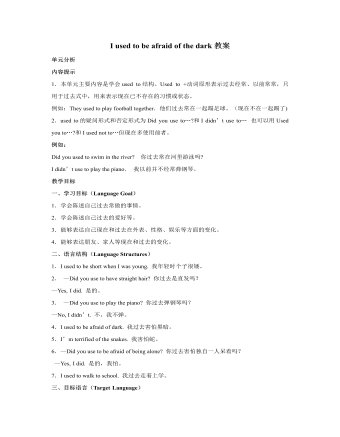
人教版新目标初中英语九年级上册I used to be afraid of the dark教案
内容提示1.本单元主要内容是学会used to结构。Used to +动词原形表示过去经常、以前常常,只用于过去式中,用来表示现在已不存在的习惯或状态。例如:They used to play football together.他们过去常在一起蹋足球。(现在不在一起踢了)2.used to的疑问形式和否定形式为Did you use to…?和I didn’t use to… 也可以用Used you to…?和I used not to…但现在多使用前者。例如:Did you used to swim in the river? 你过去常在河里游泳吗?I didn’t use to play the piano. 我以前并不经常弹钢琴。教学目标一、学习目标(Language Goal) 1.学会陈述自己过去常做的事情。2.学会陈述自己过去的爱好等。3.能够表达自己现在和过去在外表、性格、娱乐等方面的变化。4.能够表达朋友、家人等现在和过去的变化。二、语言结构(Language Structures) 1.I used to be short when I was young. 我年轻时个子很矮。 2. —Did you use to have straight hair? 你过去是直发吗?—Yes, I did. 是的。 3. —Did you use to play the piano? 你过去弹钢琴吗?—No, I didn’t. 不,我不弹。 4.I used to be afraid of dark. 我过去害怕黑暗。 5.I’m terrified of the snakes. 我害怕蛇。

人教版新目标初中英语九年级下册By the time I got outside, the bus had already left教案
Ⅰ. Teaching Aims and Demands1. Knowledge Objects(1) Key Vocabularyoversleep(2) Target LanguageWhat happened?I overslept. And by the time I got up, my brother had already gotten in the shower.2. Ability Objects(1) Teach the students to use the new words.(2) Train the students to narrate past events with the Past Perfect Tense.(3) Train the students' listening and speaking skills with the target language.3. Moral ObjectIt’s a good habit to go to bed early in the evening and get up early in the morning. So you’ll never be in a hurry in the morning.Ⅱ. Teaching Key Points1. Key Vocabularyoversleep2. Target LanguageNarrate past events with the Past Perfect TenseⅢ. Teaching Difficult Points1. Train the students to narrate past events with the Past Perfect Tense.2. Train the students to understand the target language in spoken conversation.Ⅳ. Teaching Methods1. Thinking of examples from the students' real lives.2. Making sentences by looking at the pictures.Ⅴ. Teaching AidA tape recorderⅥ. Teaching ProceduresStep I Revision1. Revise the language points in Unit 8.Ask some questions like this: What volunteer work would you like to do?Help the students to answer, I’d like to…/I love to…/I hope to2. Practice the dialogue in Activity 3c on page 62 again. Get students to role play the similar dialogues with the following.
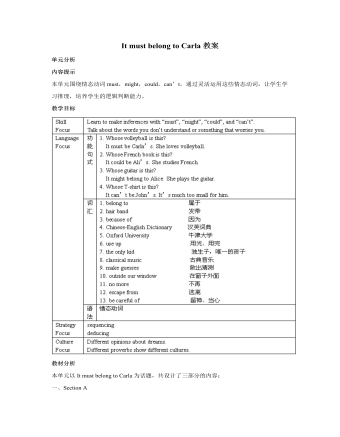
人教版新目标初中英语九年级上册It must belong to Carla教案
一、Section A该部分有4个模块。第一模块围绕Whose volleyball is this? 这一话题展开思维( 1a)、听力(1b)、口语( 1c)训练;第二模块围绕上一模块中的话题进行听力( 2a-2b)、口语训练( 2c);第三模块继续围绕前两个模块中的“making inferences”展开训练。训练形式为阅读排序( 3a)和两人问答(3b);第四模块仍就上一话题展开讨论。二、Section B该部分有4个模块。第一模块要求根据图画和所提供的单词写出合理的句子;第二模块在听力( 2a-2b)和分角色口语训练( 2c)的基础上,继续进行“推测”训练; 第三模块围绕“Strange events in Bell Tower neighborhood”这一话题展开阅读( 3a)和写作(3b -3c)训练;第四模块以dream为话题展开小组活动。三、Self Check该部分有3个模块。第一模块以填空形式对所学词汇进行训练;第二模块就8个谚语展开阅读和讨论。

人教版新目标初中英语九年级下册Rainy days make me sad教案
1. 教材分析本单元以how do things affect you?为话题, 从颜色、天气、音乐、广告、产品等方面谈论了外界事物如何影响人的心情。要求学生掌握表达某物或某事给人带来的感觉、看法或影响等。共设计了四个部分的内容:Section A 该部分有4个模块:第一模块围绕Which restaurant would you like to go to?这一话题展开思维(1a)、听力(1b)、口语(1c)训练;第二模块围绕How does music affect you? 进行听力(2a-2b)、口语训练(2c);第三模块继续围绕how do colors in the restaurant affect you这一话题展开训练,训练形式为阅读和问题体验(3a)和小组活动(3b);第四模块仍就How do things affect you这一话题以调查的形式展开讨论。Section B该部分有4个模块:第一模块围绕产品广告对人们的影响这一话题以“配对”(1a)与“列举”(1b)两种形式展开训练;第二模块继续围绕How do things affect you? 进行听力(2a-2b)、口语对话训练(2c);第三模块围绕“Advertising”这一话题展开阅读(3a-3b)和写作(3c)训练;第四模块围绕How posters affect you这一话题以口语训练形式展开小组活动。

人教版新目标初中英语九年级下册Could you please tell me where the restrooms are教案
Step Ⅰ RevisionCheck homework. Ask a few students to read the article in 3a.Then ask a few students to read their guides.Step Ⅱ Part 1Look at the words in the box. Ask a student to read them. Make sure the students understand the meaning of the words. You are to fill in the blanks with the words. In some cases, students may need to use another form of the word, for example adjusting for tense or subject/ verb agreement.Ask students to fill in the blanks on their own.Check the answers. Step ⅢPart 2Go through the instructions with the class.Look at the example with the students.Ask students what the answer would be.Ask a student to read the question and answer it.Excuse me, could you tell me where the bank is, please?The bank is across the street from the shopping malt.Get students to complete the work in pairs.Check the answers. Ask a few students to read their questions.Step Ⅳ Just for Fun!Ask all the students to read the conversation. Ask: What is funny about this cartoon? Help students to explain. A Martian is a person from the planet Mars.There is no such thing as Martian food on Earth, and the clerk looks silly because he is trying to think of where there is a Martian restaurant.Invite some pairs of students to present this conversation to the rest of the class.Step Ⅴ Summary and HomeworkIn this class, we’ve done much writing practice using the key vocabulary words and the target language presented in this unit. After class, please finish the questions in 2 in your exercise books. Then finish the exercises on pages 47~48 of the workbook as well.The Seventh Period Ⅰ Teaching Aims and Demands1. Knowledge Objects(1) Key Vocabularyimage, adventure, jealousy, hero, crime, journey, brave, no longer, show interest in, take it easy, become interested in, plain looks(2)Text:Grown-ups like cartoons, too.2. Ability Objects(1) Fast-reading to get a general idea of the text.(2) Careful-reading to get the detailed information in the text.

人教版新目标初中英语九年级下册I’ll help clean up the city parks教案
Talk about offering help (P60)I’ll help clean up the city parks.A: I’d like to work ...B: You could help ...Talk about ways to tell people about the Clean-Up Day (P61)We need to ...We can’t ...I’ll ...Talk about the work the volunteers do (P62)These three students all volunteer their time to help other people.Somebody loves to ... / helps ... / plans to ... / wants to ...A: What do you like doing?B: I like ... A: What kind of volunteer work do you think I could do?B: You could ...1. 重点词汇advertisement, fix, repair, pleasure, blind, deaf, shut, carry, specially, fetch2. 认读词汇hunger, homeless, cheer, clean-up, sign, establish, major, commitment, elementary, veterinarian, coach, similar, call-in, strategy, disabled, organization, unable, support, appreciate, donation, part of speech, pronoun, adverb, preposition, conjunction, donate, Jimmy, Sally3. 词组clean up, cheer up, give out, put off, set up, think up, take after, fix up, give away, put up, hand out, work out, at once

人教版新目标初中英语九年级下册You’re supposed to shake hands教案
教学目标:1. 掌握本单元一些重点词汇的写法和用法。2. 学会自如谈论餐桌礼仪。Step 1 RevisionAsk some students to retell the customs at the table in France in the passage in 3a.Step 2 Self checkPart 1. Fill in each bland with the correct word given. Students do the exercises by themselves at first. Then check the answers. Ask the students to comprehend the sentences and help them point out uses of some words, like “arrive (at / in) sw., spend time / money on sth , spend time / money (in) doing sth.”Part 2. Read about Fan Ling’s experience in a western restaurant. Understand the passage. Point out some key points in the passage.1. be / get used to doing sth. 习惯做某事2. begin with = start with 以….开头3. crowd v. 挤满,塞满 the crowd 人群 crowded adj. 拥挤的Then students discuss about how she would solve her problem. Ask some to share their stories with others.Part 3. Complete the crossword by looking at the sentences on the left. Then check the answers.
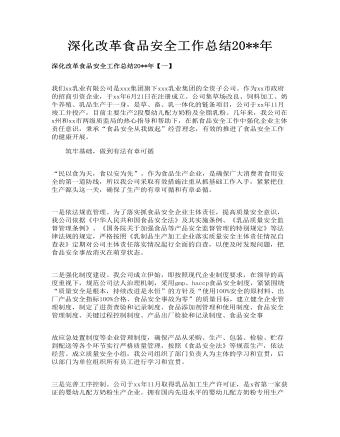
深化改革食品安全工作总结
筑牢基础,做到有法有章可循 “民以食为天,食以安为先”。作为食品生产企业,是确保广大消费者食用安全的第一道防线,所以我公司采取有效措施注重从抓基础工作入手,紧紧把住生产源头这一关,确保了生产的有章可循和有章必循。 一是依法规范管理。为了落实抓食品安全企业主体责任,提高质量安全意识,我公司依据《中华人民共和国食品安全法》及其实施条例、《乳品质量安全监督管理条例》、《国务院关于加强食品等产品安全监督管理的特别规定》等法律法规的规定,严格按照《乳制品生产加工企业落实质量安全主体责任情况自查表》定期对公司主体责任落实情况起行全面的自查,以便及时发现问题,把食品安全事故消灭在萌芽状态。 二是强化制度建设。我公司成立伊始,即按照现代企业制度要求,在领导的高度重视下,规范公司法人治理机制,采用gmp、haccp食品安全制度,紧紧围绕“质量安全是根本,持续改进是永恒”的方针及“使用100%安全的原材料、出厂产品安全指标100%合格、食品安全事故为零”的质量目标,建立健全企业管理制度,制定了进货查验和记录制度、食品添加剂管理和使用制度、食品安全管理制度、关键过程控制制度、产品出厂检验和记录制度、食品安全事 故应急处置制度等企业管理制度,确保产品从采购、生产、包装、检验、贮存到配送等各个环节实行严格质量管理,按照《食品安全法》等规范生产,依法经营。成立质量安全小组,我公司组织了部门负责人为主体的学习和宣贯,后以部门为单位组织所有员工进行学习和宣贯。
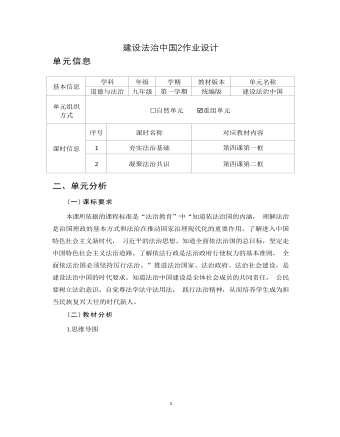
九年级上册道德与法治建设法治中国2作业设计
6.新冠肺炎疫情发生以来,中央强调,在疫情防控工作中,要坚决反对形式主义、 官僚主义, 让基层干部把更多精力投入到疫情防控第一线。这样要求 ( )①有利于政府工作人员依法行政②有利于政府履行职责,维护广大人民群众的根本利益③有利于形成良好的社会风气④警示人类必须坚持走可持续发展的道路A. ①②③ B. ①②④ C. ①③④ D. ②③④ 7.中央纪委监察部网站(现中央纪委国家监委网站)开通纠正“四风”(形式主义、 官僚主义、 享乐主义和奢靡之风) 监督举报直通车,引导网友积极举报各种公款 吃喝、公款旅游等“四风”问题。这一做法 ( )①扩大了我国公民的政治经济权利②有利于政府依法行政,实现国家长治久安③有利于提高我国公民的民主监督意识④有利于国家机关及其工作人员勤政廉洁A. ①②③ B. ①②④ C. ①③④ D. ②③④ 8.《孟子 ·离娄上》有言:“徒善不足以为政, 徒法不能以自行。”
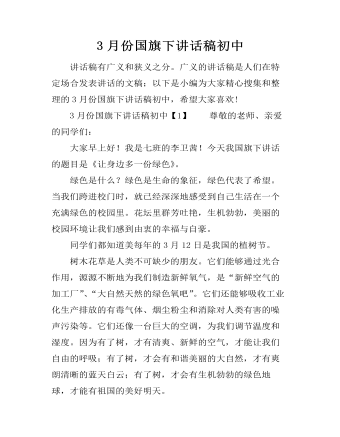
3月份国旗下讲话稿初中
讲话稿有广义和狭义之分。广义的讲话稿是人们在特定场合发表讲话的文稿;以下是小编为大家精心搜集和整理的3月份国旗下讲话稿初中,希望大家喜欢!3月份国旗下讲话稿初中【1】 尊敬的老师、亲爱的同学们:大家早上好!我是七班的李卫茜!今天我国旗下讲话的题目是《让身边多一份绿色》。绿色是什么?绿色是生命的象征,绿色代表了希望。当我们跨进校门时,就已经深深地感受到自己生活在一个充满绿色的校园里。花坛里群芳吐艳,生机勃勃,美丽的校园环境让我们感到由衷的幸福与自豪。同学们都知道美每年的3月12日是我国的植树节。树木花草是人类不可缺少的朋友。它们能够通过光合作用,源源不断地为我们制造新鲜氧气,是“新鲜空气的加工厂”、“大自然天然的绿色氧吧”。它们还能够吸收工业化生产排放的有毒气体、烟尘粉尘和消除对人类有害的噪声污染等。它们还像一台巨大的空调,为我们调节温度和湿度。因为有了树,才有清爽、新鲜的空气,才能让我们自由的呼吸;有了树,才会有和谐美丽的大自然,才有爽朗清晰的蓝天白云;有了树,才会有生机勃勃的绿色地球,才能有祖国的美好明天。
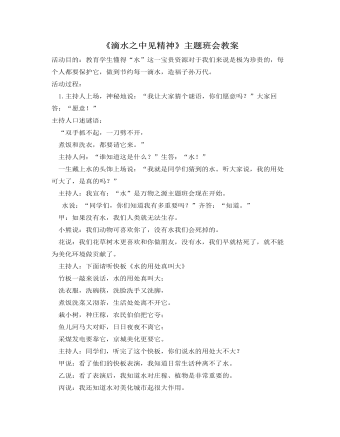
《滴水之中见精神》主题班会教案
主持人:下面请听快板《水的用处真叫大》竹板一敲来说话,水的用处真叫大;洗衣服,洗碗筷,洗脸洗手又洗脚,煮饭洗菜又沏茶,生活处处离不开它。栽小树,种庄稼,农民伯伯把它夸;鱼儿河马大对虾,日日夜夜不离它;采煤发电要靠它,京城美化更要它。主持人:同学们,听完了这个快板,你们说水的用处大不大?甲说:看了他们的快板表演,我知道日常生活种离不了水。乙说:看了表演后,我知道水对庄稼、植物是非常重要的。丙说:我还知道水对美化城市起很大作用。2.主持人:水有这么多用处,你们该怎样做呢?(1)(生):我要节约用水,保护水源。(2)(生):我以前把水壶剩的水随便就到掉很不对,以后我一定把喝剩下的水倒在盆里洗手用。(3)(生):前几天,我看到了学校电视里转播的“水日谈水”的节目,很受教育,同学们看得可认真了,知道了我们北京是个缺水城市,我们再不能浪费水了。(4)(生):我要用洗脚水冲厕所。
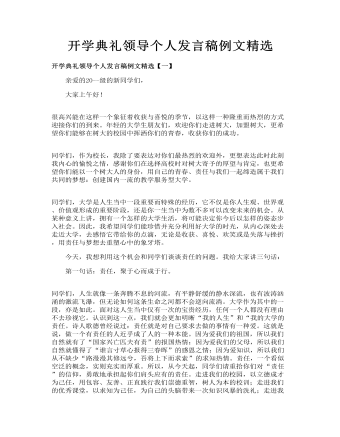
开学典礼领导个人发言讲话稿例文精选
同学们,人生就像一条奔腾不息的河流,有平静舒缓的静水深流,也有波涛汹涌的激流飞瀑,但无论如何这条生命之河都不会逆向流淌。大学作为其中的一段,亦是如此。面对这人生当中仅有一次的宝贵经历,任何一个人都没有理由不去珍视它。认识到这一点,我们就会更加明晰“我的人生”和“我的大学的责任。诗人歌德曾经说过:责任就是对自己要求去做的事情有一种爱。这就是说,做一个有责任的人近乎成了人的一种本能。因为爱我们的祖国,所以我们自然就有了“国家兴亡匹夫有责”的报国热情;因为爱我们的父母,所以我们自然就懂得了“谁言寸草心报得三春晖”的感恩之情;因为爱知识,所以我们从不缺少“路漫漫其修远兮,吾将上下而求索”的求知热情。责任,一个看似空泛的概念,实则充实而厚重。
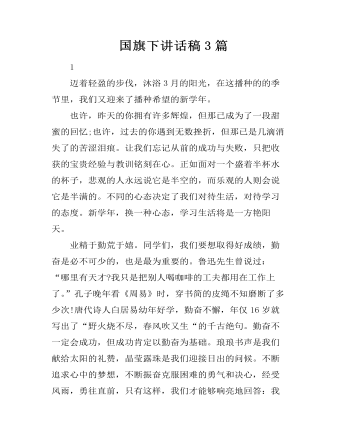
国旗下讲话稿3篇
迈着轻盈的步伐,沐浴3月的阳光,在这播种的的季节里,我们又迎来了播种希望的新学年。也许,昨天的你拥有许多辉煌,但那已成为了一段甜蜜的回忆;也许,过去的你遇到无数挫折,但那已是几滴消失了的苦涩泪痕。让我们忘记从前的成功与失败,只把收获的宝贵经验与教训铭刻在心。正如面对一个盛着半杯水的杯子,悲观的人永远说它是半空的,而乐观的人则会说它是半满的。不同的心态决定了我们对待生活,对待学习的态度。新学年,换一种心态,学习生活将是一方艳阳天。业精于勤荒于嬉。同学们,我们要想取得好成绩,勤奋是必不可少的,也是最为重要的。鲁迅先生曾说过:“哪里有天才?我只是把别人喝咖啡的工夫都用在工作上了。”孔子晚年看《周易》时,穿书简的皮绳不知磨断了多少次!唐代诗人白居易幼年好学,勤奋不懈,年仅16岁就写出了“野火烧不尽,春风吹又生“的千古绝句。勤奋不一定会成功,但成功肯定以勤奋为基础。琅琅书声是我们献给太阳的礼赞,晶莹露珠是我们迎接日出的问候。不断追求心中的梦想,不断振奋克服困难的勇气和决心,经受风雨,勇往直前,只有这样,我们才能够响亮地回答:我们没有虚度时光。
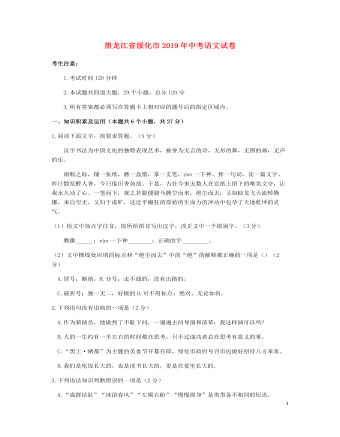
黑龙江省绥化市2019年中考语文真题试题
失掉了他信力,就会疑,一个转身,也许能够只相信了自己,倒是一条新生路,但不幸的是逐渐玄虚起来了。信"地"和"物",还是切实的东西,国联就渺茫,不过这还可以令人不久就省悟到依赖它的不可靠。一到求神拜佛,可就玄虚之至了,有益或是有害,一时就找不出分明的结果来,它可以令人更长久的麻醉着自己。
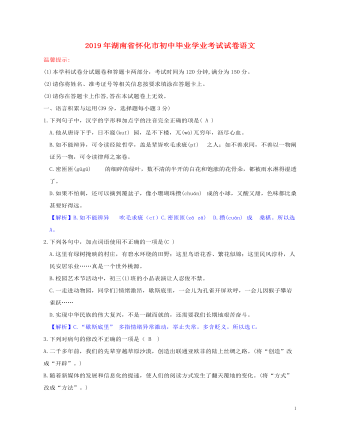
湖南省怀化市2019年中考语文真题试题(含解析)
怀化地处武陵、雪峰两大山脉之间,森林覆盖率高达70. 83%,素有“广木之乡、水果之乡、药材之乡”的美誉。水能理论蕴藏量499万千瓦,是全国十大水电基地的主体地带。有中药材1900多个品种,其中175 种国家重点中药材,茯苓、天麻产量居全国第一。硅砂、重晶石储量居全国前列,黄金、铜、磷储量分居湖南第一、三、四位。怀化高新技术产业开发区位于贵阳-重庆-宜昌-长沙-桂林这一半径400公里的环形空间中心。其东西对接长三角经济区、长株潭两型试验区与成渝经济区,连接新丝绸之路“渝新欧”国际铁路大通道;南北对接环北部湾、珠三角与长江经济带。这里是商贸物流的最佳辐射半径,是投资兴业的黄金投资圈。
